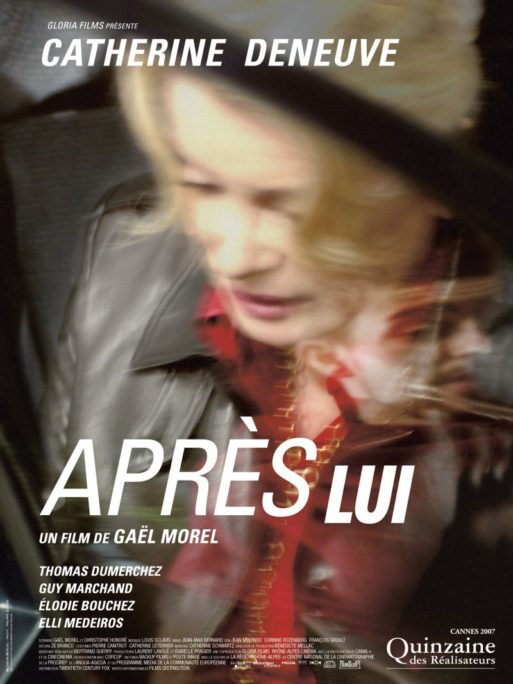 Après Lui opens with two male best friends goofing around by dressing up in one of the men’s mothers’ clothes and dancing around to music. They invite the one friend’s mother, Camille (played by the amazing Catherine Deneuve) to come in and laughter ensues when she helps them with their makeup so they can crash their other friend’s stag party in their costumes. These first five minutes of Morel’s Après Lui foreshadow how deeply the one man’s mother and his best friend love him. By the eighth minute of the film, Camille receives a phone call from the police that her son has died in a car crash and her whole world turns upside down with how she handles her grief.
Après Lui opens with two male best friends goofing around by dressing up in one of the men’s mothers’ clothes and dancing around to music. They invite the one friend’s mother, Camille (played by the amazing Catherine Deneuve) to come in and laughter ensues when she helps them with their makeup so they can crash their other friend’s stag party in their costumes. These first five minutes of Morel’s Après Lui foreshadow how deeply the one man’s mother and his best friend love him. By the eighth minute of the film, Camille receives a phone call from the police that her son has died in a car crash and her whole world turns upside down with how she handles her grief.
Viewers see her experiencing the raw emotions that many encounter in the early stages of grief, such as when she suddenly breaks down sobbing while talking with her ex-husband and preparing her son’s outfit for the funeral.
Catherine Deneuve shines as a grieving mother dealing with a life-changing loss. Viewers see her experiencing the raw emotions that many encounter in the early stages of grief, such as when she suddenly breaks down sobbing while talking with her ex-husband and preparing her son’s outfit for the funeral. This scene demonstrates how the reality of her son’s permanent absence is beginning to sink in for Camille.
While the main focus is on Camille and her budding (and later too close for almost everyone’s comfort) friendship with her late son’s best friend who drove the car that killed her son, Morel cleverly allows us snippets into how other family members are dealing with their own versions of the grieving process. From Camille’s daughter taking her anger out on her brother’s best friend when her mother invites him to the gathering after the funeral to her ex-husband hugging and smelling the son’s pillow in his room at Camille’s house, we, as spectators into this grieving family’s process, see how individual the grieving process truly can be.
As most of her family would rather have nothing to do with the man who caused the accident, Camille innocently turns to him in the hopes that she can learn more about what her son was like. In order to move on, she hopes he can provide her with answers to many unanswered questions. As months pass, this obsession with knowing her son’s best friend turns into an unhealthy habit of stalking him and being present wherever he is.
While the rest of her family seems to have move forward in spite of the sadness, Camille’s grief has turned into a complicated grief, where she seems unable to think of anything or anyone beyond the son she has lost. One clear example would be her inability to bond with or take care of her newborn grandson. We see how she barely stays to visit after he is born as well as when her daughter busies herself cleaning Camille’s house during a visit and Camille is completely oblivious when her grandson starts wailing. Camille turns her anger at her son’s absence (by now about nine months after his death) towards her daughter and shakes her as she tries to nurse. Her daughter screams at her that she will never lose her in the same way that her brother died. In essence, she wants her mother to know that she does not need to worry about her disappearing.
Grief does not correlate with the classic motto, “One size fits all.”
Après Lui is a must-see film, with brilliant performances by the entire cast, to help us understand the complexities of grief. Grief does not correlate with the classic motto, “One size fits all.” This film will leave you pondering deep questions about how society causes many to believe that the grieving process should follow the same pattern and time period for everyone, when in fact a good portion of people struggle with it atypically from a set time and process.

 Après Lui (2007) by Gaël Morel
Après Lui (2007) by Gaël Morel



 Trans Remembrance Project Provides a Community of Grieving
Trans Remembrance Project Provides a Community of Grieving
 Caring for a Dying Loved One? Be Gentle With Yourself.
Caring for a Dying Loved One? Be Gentle With Yourself.














